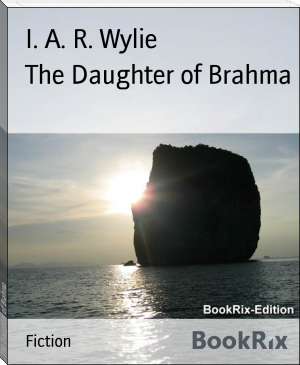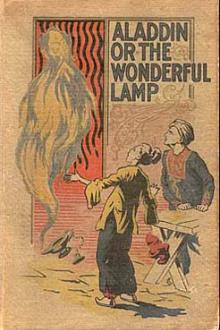The Daughter of Brahma - I. A. R. Wylie (ereader iphone .TXT) 📗

- Author: I. A. R. Wylie
Book online «The Daughter of Brahma - I. A. R. Wylie (ereader iphone .TXT) 📗». Author I. A. R. Wylie
Hurst rang the bell.
"Lady Hurst is my wife," he said simply.
"Heavens above us! I know, Sir David. But what's going to count most the poll to-morrow, or Lady Hurst?"
"Lady Hurst."
The little man gave a despairing sigh.
"Well, I've said what I had to say, and I know better than to suppose you'll take any notice of me. You've gone your own way all along, Sir David; you've gone over hedges and ditches rough-shod most of the time; and I've followed you straight you'll admit that much. But this is too tall. It will break your political neck, Sir David. You can't flaunt your contempt for their prejudices in the faces of people whose votes you want."
Hurst turned and confronted the speaker. His face looked calm enough, and yet there was a nervous twitching about the mouth which betrayed him.
"You're a good fellow, Smith," he said. "You've done splendidly for me you've taught me the ropes, and helped me as a friend might have done. I'm a mere novice at the game I am playing, and hi your eyes I must seem little more than an obstinate boy. But I'd like to ask you one thing. You're married yourself, aren't you?"
"Certainly, Sir David."
"Well, would you accept hospitality from a man who shut his door in your wife's face?"
The agent flushed.
"No, Sir David, I would not."
"Then you understand how I feel. I don't want the vote of any man who does not accept my wife with me."
Mr. Smith groaned.
"You're bringing your private sensibilities into public life," he said. "It isn't done, Sir David; it isn't politics."
"I don't care a brass farthing whether it is politics or not," David burst out with a sudden rage. "It's my way and I'm going it right to the bitter end." He went to the door. "Are you coming, or are you not?" he said over his shoulder.
The little agent buttoned up his overcoat.
"I'm coming," he said.
The drive to Ashley was a long and silent one. Diana and Hurst sat opposite one another, but Diana avoided his eyes. In the last hour her attitude towards him had changed subtly yet vitally. A secret, which in the weeks of their constant companionship had lain unacknowledged at the bottom of her consciousness had risen in one moment and confronted her. It was a secret no longer. She had recognised it, and in that recognition lay the annihilation of all that had been, the opening out of a new vista. As yet she neither knew by what road she was to travel nor by what name to call the change that had come upon her. Only one thing stood clear, and that thing a promise. :She pressed her lips together and glanced at the figure beside her.
Sarasvati sat huddled together in the corner of the carriage. In spite of her furs and the closed windows she was shivering with cold, and there was a blue tinge about her cheeks, which made her old and wan-looking. The lustrous brown had died out of her eyes; they stared dull and colourless out of the window, and all her rich, warm beauty which had once deemed so invincible shrivelled and faded in the pitiless grey light, like a hot-house plant exposed to the cold blast of a winter wind.
Diana glanced quickly away, as though the sight pained her, and for a moment, held by the force of contrast, her eyes rested on the man opposite her. Here lay the other side of the tragedy. In the swift, almost incredible development of the moody, stunted boy into a strong man, freed from the shackles of his own pessimism, lay an irony of circumstances which filled her with pity. He was still young; in certain moments of relaxation his rough-hewn features could look boyish; but they were now set in lines of defiant, implacable decision which made him older than his years and separated him by a broad gulf from the David Hurst of Kolruna, the boy of unformed desires and bitter inertia. Diana knew when he had changed, and how. Love had forced him out into the battle and given him strength, and love now dragged him down, disarmed him for the already unequal fight. She wondered if he knew it.
As they passed the first low-built cottages of Ashley she saw that he drew himself up, and the skin about his jaw whitened with the tension. But he gave no other sign. When the carriage drew up before the schoolhouse where the meeting was to be held, he got out first in order to help his wife to the ground, and a crowd of village yokels cheered him. But the cheer died quite suddenly to silence. It was a silence half hostile, half curious. The members of the Committee who had come out to greet the arrivals seemed oppressed with an extraordinary embarrassment. They shook hands with Diana and with their candidate and bowed to Sarasvati, but their welcome seemed to have frozen on their faces. Squire Morell, who claimed seniority, broke the silence.
"Lord Salby has not yet arrived," he said stiffly. "We are expecting him every minute. If the ladies would, take their places perhaps you would wait for him in the committee-room, Sir David. Mr. Smith, will you show the way?"
The agent obediently elbowed a passage through the crowd, and Lady Hurst and Diana followed him. The schoolroom, transformed for the occasion into a fair-sized hall, was already filled to overflowing, and there were hostile elements in the closely packed assembly, as Mr. Smith knew well enough. His practised nose scented trouble in the close atmosphere, and before he had gone half a dozen steps in the direction of the reserved seats his fears were confirmed. There was an uneasy movement, a craning of necks, a low murmur which broke out here and there into exclamations, laughter, and " boos " of open mockery. Mr. Smith kept countenance. He had endured worse things, but at the bottom of his eager, enthusiastic soul he cursed the alien woman at his side.
Sarasvati clung to Diana Chichester's arm. In the midst of this curious, hate-filled crowd of rough countrymen her courage seemed to fail her utterly. She was trembling, and the fur hood which had slipped back on to her shoulders revealed- a face that had lost all trace of loveliness in a paroxysm of fear. In that moment all that was most Oriental in her, most antipathetic in her race, seemed to rise to the surface of her being. The veil of her divine origin had been wrenched roughly from her? and she became what the hostile eyes saw in her a common, native woman, a creature of an inferior and despised race. Mechanically she took her place in the front row before the platform, and the intermittent jeering broke out afresh, mingled this time with half-hearted countercheers.
David Hurst heard them. He stood alone in the committee-room, where he had been left at his own request. He had feigned a momentary indisposition, and the committee members, themselves ill at ease, had willingly accepted the excuse to await the arrival of Lord Salby. Hurst drew back into the recess of the old-fashioned window from whence he could watch the crowd outside. He felt nauseated, overcome by a disgust with himself, with the coarse-faced men whose favour he was about to crave, on whose goodwill depended his whole future. He hated them with a hatred which seemed like a rebirth of his old laming misanthropy. Now, as then, his whole energy and thought fought for an outlet for the right to serve; now, as then, a barrier rose and cut him off from those to whom his service was dedicated and thrust him back into a deeper loneliness.
In the world in which he was fighting for place he had no friends. The men who supported him acted out of principle a little perhaps because they saw in him the man of mounting ability; but not out of friendship. There could be no friendship between them. There was the barrier, unnamed but unsurmountable. He had broken the law of caste, and his punishment was inevitable and most logical. He faced it now without flinching. He heard the jeering laughter which had greeted his wife's entrance, and set his teeth. That, too, was part of his punishment. He had forced his way into the world, and she had striven to follow him. Her love had brought the highest sacrifice without complaint. But it had been in vain. She was not of this world. Like a haunting spirit of fancy, she had crept out into the garish reality, and had faded to a poor, piteous shadow of herself. The daughter of Brahma, the child of gorgeous Oriental imagination, had died, he had lost her, with his old dreams, in the fight after the world's rewards, and in 18 her place stood the native, the barrier between him and his kind. He felt no pity for himself. He was paying the just price but he had done wrong to the woman to whom he owed all that he had become. She suffered. He remembered her strange fears of the "shadows " which would one day claim him. They had claimed him, and, as she had prophesied, the light in her had gone out. Yes, he had done wrong; but only in so far as he had brought her into a battle against the narrow-hearted prejudices of the world. The battle he had fought was a just one, but he was losing had lost and, as is the way of things, the woman paid the highest indemnity.
A carriage rolled up to the door of the schoolhouse. Hurst saw a tall, fair man step quickly out and respond with a careless good-nature to the hearty reception of the crowd outside. Hurst threw back his dark head with a movement of bitter contempt. This, then, was the popular, fox-hunting lord whose debts so rumour had it were regularly paid by his Hebrew wife, and who had come to patronise him and help him over the disadvantages of his mesalliance. Hurst laughed out aloud. But he was beginning to feel the rise of a violence which was new to him. He heard voices outside a low murmur of greeting and then loud, boisterous tones which drew rapidly nearer.
"Who the devil was that?" David heard. "What, Lady Hurst? Good Lord you don't say so? I didn't know it was as bad as that. Why, man alive, one doesn't marry that sort of thing!"
There was a laugh. David Hurst turned and came out of the alcove. Through an unsteady, shifting mist he saw Lord Salby, standing in the doorway against a background of frock-coated followers, and he went up to him and struck the red smiling face with a calculated, swift precision. There was no impulse in the action. It seemed to him that everything in the last few months had led up to this outbreak, that the torment of the last few minutes had been but the goad to drive him to a final step. When the mist cleared, and he found himself standing alone in the middle of the room, he felt no surprise at





Comments (0)